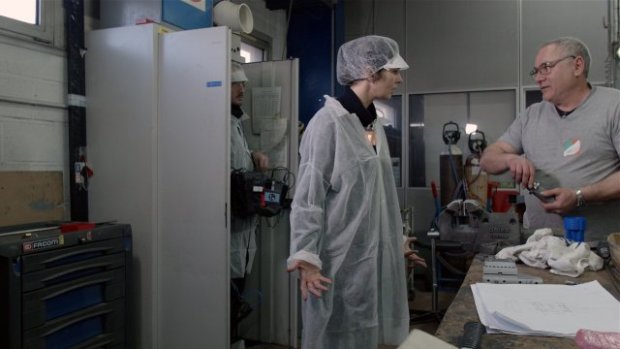Emmanuelle Lainé, Incremental Self: Transparent Bodies

- Film still from "Incremental Self: Transparent Bodies", Emmanuelle Lainé – 2017. Commissioned by Bétonsalon - Center for Art and Research. Courtesy FRALIB SCOP-TI.
Opening on March 7, 2017 from 6 pm to 9 pm
Curated by Mélanie Bouteloup
Bétonsalon – Center for Art and Research presents a solo exhibition by Emmanuelle Lainé. With Incremental Self, the French artist takes over the refurbished spaces of Bétonsalon by means of a monumental installation integrating a multi-screen film with an accumulation of objects and pieces of furniture deviated from their original context.
Our lives are fragile and precarious. Yet they are multiple, collective, and uncontrollable. This is what artist Emmanuelle Lainé manifests in her exhibition Incremental Self: Transparent Bodies.
The bodies we observe in her filmic installation—students, retired artists, workers—are in transitional places where different sorts of exchanges are taking place. They are evolving in spaces of negotiation where successive layers of identity are being performed in interaction with given economic, sensible, and even symbolic facts and objects.
What should we do with of all these stories, anecdotes, and memories told by each and every one of us? How to make these narratives biting? To exhibit oneself is to demonstrate a form of resistance, while reconnecting with one’s own fragility.
With Incremental Self: Transparent Bodies, we are inclined to explore the following question raised by philosopher Rosi Braidotti: “How [do we] find adequate theoretical and imaginary representations for our lived conditions and how [do we] experiment together with alternative forms of posthuman subjectivity [1]?”
Emmanuelle Lainé’s exhibition is a demonstration of one’s taking shape, where humans and objects influence each other, assembling, overlapping, and mixing indiscernibly. Each permeates the other until conscience arises in their trembling selves, thus becoming transparent. Emmanuelle Lainé’s transparent bodies materialize our shifting, off-center, fragmented, and multiple identities. Even more, transparent bodies are contagious, contaminating each other.
Incremental Self will unfold at Bétonsalon - Center for Art and Research through a wide array of public programs. Discussions and collective actions will progressively accumulate within Emmanuelle Lainé’s installation, which will evolve throughout the exhibition.
About Emmanuelle Lainé
Emmanuelle Lainé (born in 1973 in Paris) lives and works in Marseille. She graduated from the École Nationale des Beaux-Arts de Paris. Elaborating on the specificities of each exhibition venue, Emmanuelle Lainé uses her host institutions’ furniture and architectural features to provide a “methodology of places” that is an interface between spaces, works and their audience. Her practice consists in monumental in-situ installations that blur distinctions between the different media she uses. This process allows her to create a complex cognitive space where several temporalities coexist, making sense only through the eye of the beholder, considered as the privileged agent of the exhibition.
She recently exhibited her works at the Palais de Tokyo (2017, 2014) and at Villa Vassilieff (2016) in Paris, at the Lyon Biennale (2015), at the GLstrand, (Copenhagen, 2015), at the Stereo Gallery (Warsaw, 2015), at the ICA Singapore (2015), at the Swiss Cultural Institute (Rome, 2014) and at La Loge Bruxelles (2013). Her works were also shown in personal exhibitions hosted by the Villa Arson (2016), the Galerie Motinternational (Bruxelles, 2015), IFAL (Mexico, 2015), the foundation Ricard (2014) and C-o-m-p-o-s-i-t-e (Brussels, 2014).
Acknowledgements
We would like to thank:
Emmanuelle Lainé, Benjamin Valenza, Mathieu Touren, Lény Lecointre, David Perreard.
The staff members of Bétonsalon - Center for Art and Research.
The Académie vivante team, and specifically: Jonathan Weitzman and students from the European Masters in Genetics at Paris-Diderot University.
The staff members and residents of the Maison Nationale des Artistes and FNAGP, and specifically: Laurence Maynier, Caroline Cournède, Seval Ozmen
Arlette Chapuis, Lise Déramond, Hélène Peguet, Claude Grisard.
The employees of SCOP-TI, Société Coopérative Ouvrière Provençale de Thés et Infusions, and specifically: Gérard Cazorla.
The Chemistry department at Paris-Diderot University and specifically: Guillaume Thoraval, glass blower.
Staff members of the Paris-Diderot University and specifically: François Montarras, Alexandre Ienibace, Stéphane Villain.
Our partners: Fondation Daniel et Nina Carasso, Paris-Diderot University, Epigenetics and Cell Fate Unit, Pernod Ricard, Fondation Nationale des Arts Graphiques et Plastiques.
And each and every one who supported us in the production of Incremental Self: Transparent Bodies: Jochen Dehn, DOC, LABOR ZERO LABOR, Palais de Tokyo.
We would also like to extend our gratitude to the different teams who worked on the renovation of Bétonsalon - Center for Art and Research: NeM / Niney et Marca Architectes, Paul de Coudenhove, Ciments Calcia, every construction worker team member, and Vittorio Cavallini / Vano Alto for designing the welcome desk.
Partners
Exhibition partners
Epigenetics and Cell Fate Unit (UMR7216 Paris Diderot University), Paris-Diderot University, Fondation Nationale des Arts Graphiques et Plastiques, Fondation Daniel et Nina Carasso, and Pernod Ricard.
Bétonsalon – Center for Art and Research is supported by the City of Paris, the Paris Diderot University – Paris 7, the Île-de-France Regional Board of Cultural Affairs – Ministry of Culture and Communication, the Île-de-France Region and Leroy Merlin – Quai d’Ivry.
The Académie vivante is supported by the Fondation Daniel et Nina Carasso.
Bétonsalon – Center for Art and Research is a member of Tram, réseau art contemporain Paris / Île-de-France and of d.c.a / association française de développement des centres d’art.
Villa Vassilieff receives support from public and private partners first and foremost from the City of Paris, the Île-de-France Region and Pernod Ricard, its lead sponsor. Villa Vassilieff also develops partnerships with the Fondation Nationale des Arts Graphiques et Plastiques, the Société des Auteurs dans les Arts Graphiques et Plastiques, the Collège d’études mondiales of the Fondation Maison des sciences de l’homme, and the Goethe Institut.
[1] Rosi Braidotti,The Posthuman, Cambridge: Polity Press, 2013, p.187
Share